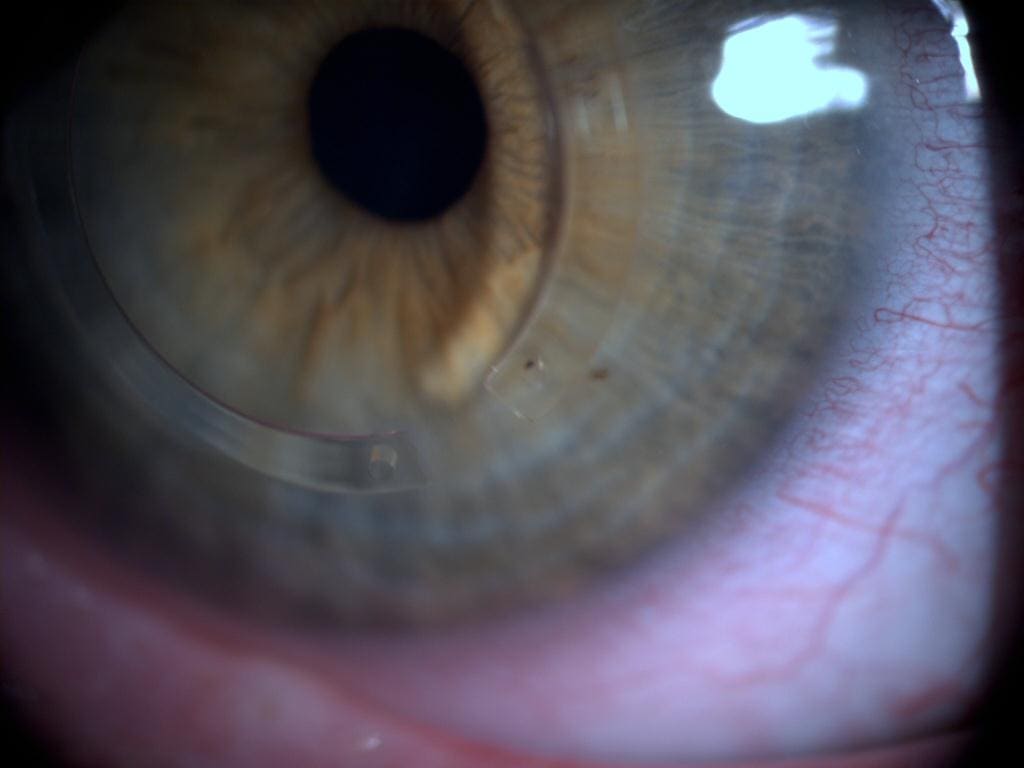INTAX treatment
Table of Content
The method of intra-cornea ring implantation (INTAX or Intacs or INTAKS) was originally developed for the correction of myopia and minor astigmatism .However, it did not become popular. Due to the tendency to cause tension in the central part and stabilizing the cornea, this method has been proposed treatment of cornea cone.. According to the manufacturer’s instructions, INTAXES should be used in people who cannot or do not tolerate hard lenses. This method does not inhibit the progress of the disease and it is not possible to achieve as good vision as with contact lenses. It allows to improve the vision in the above-mentioned indications, and postpone the moment of transplantation of cornea carried out due refractive indications. Research on combining both procedures – implanted INTAXES and implementation of Cross-linking is carried out.
What kind of surgery is INTAX?
- INTAX is a highly advanced method of extasia and keratoconus treatment . It has a more than 15 year- long history of clinical and scientific documentation.
- INTAX cornea implant corrects flattens the cornea, which helps in effective contact lens fitting to the eye.
- INTAX cornea implant helps provide the patient with the best, and useful improvement in visual acuity.
- INTAX cornea implant stabilizes the cornea, which delays the need for a corneal transplant.
- According to a survey of 76 U.S. ophthalmologists who conducted 2,136 operations such as INTAX , only 1.9% of patients had to undergo a corneal transplant as a result of the development of keratoconus (operations carried out between August 2004 and April 2008)
INTAX is mainly used in the course
- Maintaining uniformity (consistency) of the cornea.
- Ensuring the structural integrity of the weakened and affected cornea.
- Reducing myopia and astigmatism correlated with other diseases, in particular keratoconus.
- Considered penetrating corneal transplantation
- Intolerance to contact lenses.
IMPORTANT:
- If you wear contact lenses, it is very important to stop wearing them 2-3 weeks prior to your pre-operative examination. Failure to comply with it ,may result in deterioration of the results.
- If you use eye makeup, you should discontinue its use 2-3 days before surgery to reduce the risk of postoperative infection.
Duration: about 15 minutes per eye
Time spent in the operating room: about 2-3h
How does the surgery look for the patient?
- The procedure is performed in outpatient clinic and takes about 15 minutes for the eye.
- The patient should be expected to spend at least two hours in the operating room.
- The patient will feel improvement in vision after surgery , but it may take a few weeks to a few months until they will see properly.
- If the discomfort is mild, patient can return to normal activities within 2-3 days after surgery.
- Most patients experience pain after surgery ” behind the eye “. Your doctor may prescribe ibuprofen or Tylenol
After the surgery:
- Patient has to wear a shield on the eye for 30 days
- After 1 month stitches will be removed.
- Patient has to use moisturizing drops for 12 months
Possible symptoms after INTAX surgery will include a triad of factors
- Impaired perception of the light stimulus (symptoms disappear within 30-90 days after surgery) ;
- Dazzle vision
- Halo
- Photophobia – lasting from 7 to 30 days after surgery.
- Fluctuating vision ( changes in visual acuity )
Visual acuity changes about 30-90 days after treatment
Vision becomes sharper during the early hours of the morning, and steadily worsens later in the day .
Vision is stabilized after about 30 days post surgery , but some patients may experience changes in vision up to 90 days after surgery.
- 1-5 days – useful vision
- 5 – 10 days – vision improves
- 7-10 days -vision deteriorates
- 10 days and later – vision steadily improves
- Feeling presence of foreign bodies
- Patient may feel the presence of foreign bodies, which irritate the eye like eyelashes , dust or grains of sand in the eye . irritation disappears within 10 days after surgery.
- Patient should use artificial tears when they feel like it to moisten the eye for 12 months after surgery.
INTAX can be removed if the patient feels uncomfortable.
 Zdj. Intaksy – pierścienie śródrogówkowe.
Zdj. Intaksy – pierścienie śródrogówkowe.
Three steps in the rehabilitation of postoperative cornea
- Corneal rehabilitation of the patient requires the use of following procedures :
- Cornea should be constantly moistened ( for 1 year )
- About 30 days after treatment stitches are removed . Resulting fibrosis (stage of wound healing ) can cause discomfort .
- Stabilization bio-mechanisms maintaining the cornea by changing improper shape into the proper one . The change of the shape is obtained by changing the distribution of power within the cornea. This process is done surgically by using INTAXES , which flatten , align and extend the cornea so that the correct shape is obtained to allow proper vision. Stabilization takes about 18 months. In addition, if necessary, cross-linking may be used , which ( x -linking ) inhibits the further development of keratoconus . The ophthalmologist decides whether to make use of this method during the operation.
- If necessary , contact lenses or glasses are used to obtain normal acuity vision
Possible complications after INTAX surgery
- Dazzle vision
- Mild turbidity
- Photophobia
- Decentration of the rings
- Deterioration of vision
- Inflammation
- Infection
- Perforation of the cornea






